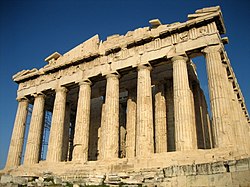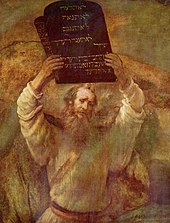History of Western civilization before AD 500
Western civilization describes the development of human
The civilizations of


Origins of the notion of "East" and "West"
The
The "East" in the
The Mediterranean and the Ancient West
The earliest
The
The ancient peoples of the
Thus, the great ancient capitals were linked — cities such as:
The earliest urban civilizations of Europe belong to the Bronze Age
By the 6th century BC, Greek colonists had spread far and wide — from the Russian Black Sea coast to the Spanish Mediterranean and through modern Italy, North Africa, Crete, Cyprus and Turkey. The Ancient Olympic Games are said to have begun in 776 BC and grew to be a major cultural event for the citizens of the Greek diaspora, who met every four years to compete in such sporting events as running, throwing, wrestling and chariot driving. Trade flourished and by 670 BC the barter economy was being replaced by a money economy, with Greeks minting coins in such places as the island of Aegina. Poultry arrived from India around 600 BC and would grow to be a European staple. The Hippocratic Oath, historically taken by doctors swearing to practice medicine ethically, is said to have been written by the Greek Hippocrates, often regarded as the father of western medicine, in Ionic Greek (late 5th century BC),[10]
The Greek city states competed and warred with each other, with Athens rising to be the most impressive. Learning from the Egyptians, Athenian art and architecture shone from 520 to 420 BC and the city completed the Parthenon around 447 BC to house a statue of their city goddess Athena. The Athenians also experimented with democracy. Property owners assembled almost weekly to make speeches and instruct their temporary rulers: a council of 500, chosen by lot or lottery, whose members could only serve a total of 2 years in a lifetime, and a smaller, high council from whom one man was selected by lottery to preside from sunset to the following sunset.[8]
Thus, the citizens' assembly shared power and prevented lifetime rulers from taking control. Military chiefs were exempt from the short term requirement however and were elected, rather than chosen by lot. Eloquent oratory became a Greek art form as speakers sought to sway large crowds of voters. Athenians believed in 'democracy' but not in equality and excluded women, slaves, the poor and foreigners from the assembly. Notions of a general "brotherhood of man" were yet to emerge.[8]
In classical tradition, Homer is the ancient Greek epic poet, author of the Iliad, the Odyssey and other works. Homer's epics stand at the beginning of the western canon of literature, exerting enormous influence on the history of fiction and literature in general.

The city of
The ancient Greeks excelled in engineering, science, logic, politics and medicine. Classical

Originally ruled by Kings who ruled the settlement and a small area of land nearby, the Romans established a republic in 509BC that would last for five centuries. Initially a small number of families shared power, later representative assemblies and elected leaders ruled. Rome remained a minor power on the Italian peninsula, but found a talent for producing soldiers and sailors and, after subduing the

Roman civilization and
Judaism and the rise of Christendom

The
Around 1,000 BC, the Israelites had a period of power under
In 63 BC,
The early followers of Jesus, including the apostles
Nevertheless, carried through the synagogues, merchants and missionaries across the known world, the new religion quickly grew in size and influence.
The population and wealth of the Roman Empire had been shifting east, and the division of Europe into a Western (Latin) and an Eastern (Greek) part was prefigured in the division of the Empire by the Emperor
The city of Rome itself never regained supremacy and was
When the
The fall of Rome
In 476 the western Roman Empire, which had ruled modern-day Italy, France, Belgium, Spain, Portugal, Austria, Switzerland and Great Britain for centuries, collapsed due to a combination of economic decline, and drastically reduced military strength which allowed invasion by barbarian tribes originating in southern Scandinavia and modern-day northern Germany. Historical opinion is divided as to the reasons for the fall of Rome, but the societal collapse encompassed both the gradual disintegration of the political, economic, military, and other social institutions of Rome as well as the barbarian invasions of Western Europe.
In Britain, several Germanic tribes invaded, including the Angles and Saxons. In Gaul (modern-day France, Belgium and parts of Switzerland) and Germania Inferior (The Netherlands), the Franks settled, in Iberia the Visigoths invaded and Italy was conquered by the Ostrogoths.
The slow decline of the Western Empire occurred over a period of roughly three centuries, culminating in 476, when
See also
- Western world
- Western culture
- History of citizenship
- History of Europe
- Modern history
- Role of the Catholic Church in Western civilization
References
- ^ Library Journal. Vol. 97. Bowker. April 1972. p. 1588.
Ancient Greece: Cradle of Western Culture (Series), disc. 6 strips with 3 discs, range: 44–60 fr., 17–18 min
- ^ Jacob Dorsey Forrest (1906). The development of western civilization: a study in ethical, economic and political evolution. The University of Chicago Press.
- ^ Cambridge University Historical Series, An Essay on Western Civilization in Its Economic Aspects, p.40: Hebraism, like Hellenism, has been an all-important factor in the development of Western Civilization; Judaism, as the precursor of Christianity, has indirectly had had much to do with shaping the ideals and morality of western nations since the Christian era.
- ^ Caltron J.H Hayas, Christianity and Western Civilization (1953), Stanford University Press, p.2: That certain distinctive features of our Western civilization — the civilization of western Europe and of America— have been shaped chiefly by Judaeo–Graeco–Christianity, Catholic and Protestant.
- ^ Horst Hutter, University of New York, Shaping the Future: Nietzsche's New Regime of the Soul And Its Ascetic Practices (2004), p.111:three mighty founders of Western culture, namely Socrates, Jesus, and Plato.
- ^ Fred Reinhard Dallmayr, Dialogue Among Civilizations: Some Exemplary Voices (2004), p.22: Western civilization is also sometimes described as "Christian" or "Judaeo- Christian" civilization.
- ISBN 0-563-17064-6
- ^ a b c d e f g h i j k l Geoffrey Blainey; A Very Short History of the World; Penguin Books, 2004
- ^ "H2g2 - Oops".
- ISBN 978-0-8018-0184-6(1943)
- ^ "Plato". Encyclopædia Britannica. 2002.
- ^ Yenne, W. Alexander the Great: Lessons from History's Undefeated General. Palmgrave McMillan, 2010. 244 p.
- ^ Richard Tarnas, The Passion of the Western Mind (New York: Ballantine Books, 1991).
- ^ Colin Hynson, Ancient Greece (Milwaukee: World Almanac Library, 2006), 4.
- ^ Carol G. Thomas, Paths from Ancient Greece (Leiden, Netherlands: E. J. Brill, 1988).
- ^ Chris Scarre, The Penguin Historical Atlas of Ancient Rome (London: Penguin Books, 1995).
- ^ "Religion & Ethics — Judaism". BBC. Retrieved 2010-08-22.
- ^ "Judaism" (PDF). (52.1 KB)
- ^ a b "The 3 Monotheistic Religions — Essays — Noel12". StudyMode.com. 2008-05-26. Retrieved 2010-08-22.
- ^ "Judaism page, Ontario Consultants on Religious Tolerance". Religioustolerance.org. Retrieved 2010-08-22.
- ^ Jewish Contributions to Civilization: An Estimate (book)
- ^ BBC, BBC—Religion & Ethics—566, Christianity
- ^ Religion in the Roman Empire, Wiley-Blackwell, by James B. Rives, page 196
- ^ "Bona, Algeria". World Digital Library. 1899. Retrieved 2013-09-25.
- ISBN 1-56731-014-1.
- ISBN 0-300-10598-3.
- ^ Arnaldo Momigliano, echoing the trope of the sound a tree falling in the forest, titled an article in 1973, "La caduta senza rumore di un impero nel 476 d.C." ("The noiseless fall of an empire in AD 476").
Further reading
- Bavaj, Riccardo: "The West": A Conceptual Exploration , Institute of European History, 2011, retrieved: November 28, 2011.
- Atlas of World Military History, ISBN 0-7607-2025-8, edited by Richard Brooks
- Almanac of World History by Patricia S. Daniels and Stephen G. Hyslop
- The Millennium Time Tapestry ISBN 0-918223-04-0by Matthew Hurff
- The Earth and its Peoples ISBN 0-618-42765-1, edited by Jean L. Woy
- Greek Ways: How the Greeks Created Western Civilization by Bruce Thornton, Encounter Books, 2002
- How the Irish Saved Civilization: The Untold Story of Ireland's Heroic Role from the Fall of Rome to the Rise of Medieval Europe by Thomas Cahill, 1995.
Further viewing
- Civilisation: A Personal View by Kenneth Clark, a 1969 BBC television series
- The Ascent of Man, a 1973 BBC television series presented by Jacob Bronowski
